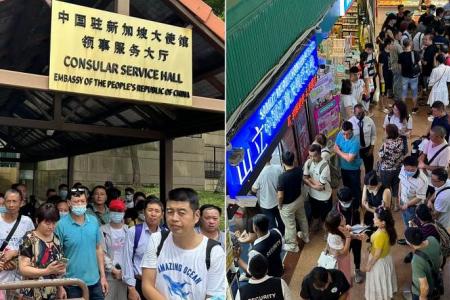Consumer watchdog Case receives 39 reports of remittance funds to China frozen by authorities there
People sending money to China via remittance companies licensed here have complained that their funds have been frozen or confiscated by the authorities there.
The Consumers Association of Singapore (Case) said it received 39 complaints between Jan 1 and Nov 14, with 14 cases reported after Oct 18.
The consumer watchdog’s president Melvin Yong told The Straits Times that the affected individuals had their recipient bank accounts in China frozen by the authorities there. Some of the customers also had their remitted funds confiscated, he added.
Chinese-language daily Lianhe Zaobao quoted customers who said that about 1,000 Chinese nationals are affected, with around 30 million yuan (S$5.6 million) in funds involved.
The customers added that over 100 people visited the Police Cantonment Complex on Nov 19 to lodge reports.
Crowds have also gathered at the Chinese Embassy in Singapore and at remittance companies in Chinatown to seek assistance, reported Shin Min Daily News.
Mr Gao Yajie, a 37-year old Chinese national, reportedly sent the equivalent of $8,500 to China through service provider Samlit Moneychanger in May.
He found that the sum was transferred via three unknown personal bank accounts that did not bear the company’s name.
The police in China informed him in September that his funds had been frozen, after two of the accounts were linked to an ongoing investigation into an online gambling case, he told Lianhe Zaobao.
Remittance service providers typically give customers a choice of how they want their funds transferred, companies in the industry told ST.
They can opt to transfer the funds through banks or Chinese payment services firm UnionPay. Alternatively, they can go through third-party payout agents, who perform the transfer using various personal or corporate bank accounts.
These agents usually offer a better exchange rate, but there is a higher risk of funds being frozen.
Customers are made aware of the risk in writing, and sign waivers exempting the remittance service providers from liabilities should the funds be frozen, said the companies.
In response to queries, the Singapore Police Force and Monetary Authority of Singapore (MAS) confirmed in a joint statement that reports involving alleged breaches of agreements have been made against some remittance companies.
In consultation with the Attorney-General’s Chambers, the police assessed that no criminal offence was disclosed in Singapore in these reports.
The police and MAS said the Singapore authorities have no jurisdiction over foreign authorities’ suspension of bank accounts, which may arise if third parties engaged by remittance companies’ agents in these countries fail to comply with the laws there.
Affected customers need to work with the remittance companies to satisfy the foreign authorities that the suspensions should be lifted, they added.
Remitters can obtain supporting documents from these companies, such as a letter testifying that the transactions had been performed through the companies, and provide these to the foreign authorities.
Remittance companies are expected to render full assistance and provide the necessary documents, added the police and MAS.
The 39 complaints that Case received in 2023 include 27 filed against Samlit Moneychanger, five against Zhongguo Remittance, and four against Hanshan Money Express, said Mr Yong.
The three companies are licensed by MAS to provide cross-border money transfer services, and have been in operation for over two decades.
Samlit Moneychanger declined comment when contacted. On Oct 21, the company said in a notice posted on WeChat that it was “recently seeing an uptick of cases” reported by customers.
Zhongguo Remittance told ST that about 1 per cent of its remittances to China typically come under scrutiny, although there was a slight uptick in the past two months, to 1.5 per cent.
The company said it works with only trusted and licensed partners, and noted from its experience that many accounts would be unfrozen once investigations have been completed.
Zhongguo Remittance said it would work with its customers and partners to resolve issues, adding that if funds transferred through the company are withheld by the authorities, it would provide a refund once the customer provides proof of deductions by the authorities.
Hanshan Money Express told ST that it has worked with payout partners registered in Singapore and Hong Kong with little incident in the past, but noted that “in recent months, there appeared to be more issues”.
It added that the company had fewer problems than some others in the industry as its staff advises customers to choose the less risky channel to transfer funds.
A spokesman said it helped affected customers by providing documentation that they could supply to the Chinese authorities, to clarify the source of funds.
MAS said it has engaged the remittance companies involved, and expects that they fully assist the affected individuals.
Customers who require assistance to contact the companies or wish to provide feedback on the businesses may write to MAS via https://eservices.mas.gov.sg/feedback/
They can also approach the Chinese Embassy in Singapore for consular assistance, added the police and MAS, noting that Singapore’s Foreign Ministry has been in touch with the embassy to highlight the situation.
In a notice published on Oct 24, the Chinese Embassy said it had recently received a series of reports from its citizens on this issue.
It advised its citizens to use “regular channels” such as banks to remit funds to China, and not hanker after the high exchange rates offered by non-bank channels.
Get The New Paper on your phone with the free TNP app. Download from the Apple App Store or Google Play Store now

